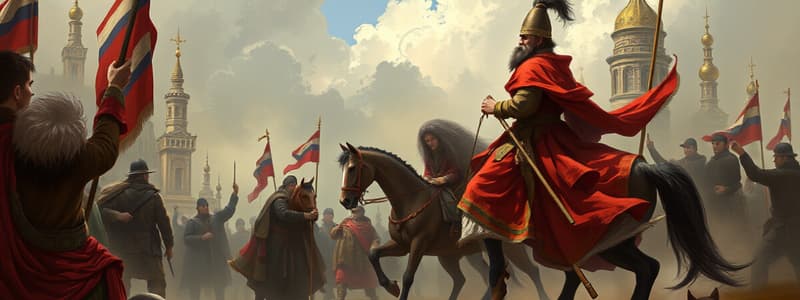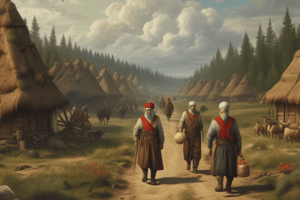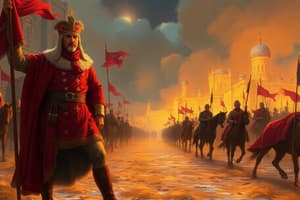Podcast
Questions and Answers
What was a major factor preventing the modernization of the Russian armed forces in the 1850s?
What was a major factor preventing the modernization of the Russian armed forces in the 1850s?
- Limited access to advanced weaponry
- Lack of financial resources
- Inability to recruit trained officers
- Need to alter the institution of serfdom (correct)
Why did Dmitrii Milyutin emphasize the need for a reform in recruitment?
Why did Dmitrii Milyutin emphasize the need for a reform in recruitment?
- To establish a reserve of trained men for wartime (correct)
- To increase military spending
- To reduce the size of the nobility
- To improve the living conditions of soldiers
Which group comprised about half of the pool of recruits for the Russian army prior to the reforms?
Which group comprised about half of the pool of recruits for the Russian army prior to the reforms?
- Common laborers
- Serfs (correct)
- Nobility
- Merchants
What did state officials recognize about serfdom before the Crimean War?
What did state officials recognize about serfdom before the Crimean War?
What change was necessary for the Russian army to emulate Western European forces?
What change was necessary for the Russian army to emulate Western European forces?
What percentage of the Russian Empire's total population were serfs on the eve of the abolition of serfdom?
What percentage of the Russian Empire's total population were serfs on the eve of the abolition of serfdom?
Which social class made up less than 1% of the Russian Empire's population?
Which social class made up less than 1% of the Russian Empire's population?
What were serfs required to provide in return for the use of land?
What were serfs required to provide in return for the use of land?
Why did the nobility defend the institution of serfdom?
Why did the nobility defend the institution of serfdom?
Which of the following best describes the economic impact of serfdom on the nobility?
Which of the following best describes the economic impact of serfdom on the nobility?
What role did the nobility play in the governance during the period of serfdom?
What role did the nobility play in the governance during the period of serfdom?
What was one of the main reasons for the slow reform of serfdom during the reigns of Nicholas I and Alexander I?
What was one of the main reasons for the slow reform of serfdom during the reigns of Nicholas I and Alexander I?
Which of the following obligations were serfs legally prohibited from doing without their owners' permission?
Which of the following obligations were serfs legally prohibited from doing without their owners' permission?
What was a significant factor that hindered the reform of serfdom in Russia?
What was a significant factor that hindered the reform of serfdom in Russia?
Which argument was not considered a main factor for the abolition of serfdom in Russia?
Which argument was not considered a main factor for the abolition of serfdom in Russia?
What was the perspective of certain Russian rulers regarding peasant unrest?
What was the perspective of certain Russian rulers regarding peasant unrest?
What role did economic considerations play in the abolition of serfdom?
What role did economic considerations play in the abolition of serfdom?
Which ruler is noted for writing about reforms that if not undertaken, could lead to revolution?
Which ruler is noted for writing about reforms that if not undertaken, could lead to revolution?
How did humanitarian considerations influence serfdom reform efforts?
How did humanitarian considerations influence serfdom reform efforts?
What impact did military failures, such as the Crimean War, have on the abolition of serfdom?
What impact did military failures, such as the Crimean War, have on the abolition of serfdom?
What was one of the contradictions in the legislation that abolished serfdom?
What was one of the contradictions in the legislation that abolished serfdom?
Which statement best illustrates the rationale behind the argument for removing serfdom based on humanitarian considerations?
Which statement best illustrates the rationale behind the argument for removing serfdom based on humanitarian considerations?
What was a common theme among Russian rulers concerning the issue of serfdom?
What was a common theme among Russian rulers concerning the issue of serfdom?
Why was the economic argument for the abolition of serfdom considered weak?
Why was the economic argument for the abolition of serfdom considered weak?
What was one major criticism of the reforms regarding serfdom?
What was one major criticism of the reforms regarding serfdom?
Which groups were noted for having a pivotal influence on the push for serfdom reforms?
Which groups were noted for having a pivotal influence on the push for serfdom reforms?
Flashcards are hidden until you start studying
Study Notes
Abolition of Serfdom in Russia
- Tsar Alexander II signed the law abolishing serfdom on February 19, 1861.
- About 22 million peasants and 100,000 noble estate owners were directly affected.
- Prior to the reform, serfs constituted approximately 35% of the Russian Empire's population.
Origins of Serfdom
- Serfdom existed from the late 16th century until 1861, in a predominantly rural society where 80-90% of the population was peasant.
- Nearly half of the peasantry were serfs of the nobility, who made up less than 1% of the population.
- Serfs were bound to noble estates, requiring permission to leave and were subject to labor and monetary obligations (barshchina and obrok).
- Nobles had significant control over serfs, including administrative and judicial power, as well as the ability to buy and sell them.
Tsar Reluctance to Reform
- Both Nicholas I and Alexander I considered reforms in western borderlands but hesitated for the Russian core.
- Significant issues included land ownership and the reluctance of nobles to part with land.
- Voluntary measures to reform serfdom were largely ignored by the nobility.
- Reform discussions intensified once it was recognized that reform would benefit the state.
Arguments for Abolishing Serfdom
- Economic Lag: Russia was falling behind Western Europe economically due to stagnant agricultural practices and lack of industrialization.
- Peasant Actions: Peasant revolts, although less prevalent in central areas, influenced rulers' thoughts on reform to alleviate discontent.
- Humanitarian Considerations: Moral arguments against serfdom emerged based on Enlightenment and Christian teachings, though these were not the primary motivators for reform.
- Military Failures: The disastrous outcomes of the Crimean War highlighted the inadequacies of the Russian armed forces, prompting a need for reform to improve military recruitment.
Broader Context
- The nobility's historical power and its role in the military and state administration contributed to reform hesitancy.
- Despite increasing economic and military pressures, the internal social structure needed a fundamental change to support modernization.
- The prevailing belief was that serfdom was a liability that needed addressing to enhance Russia's status as a major power.
Studying That Suits You
Use AI to generate personalized quizzes and flashcards to suit your learning preferences.




